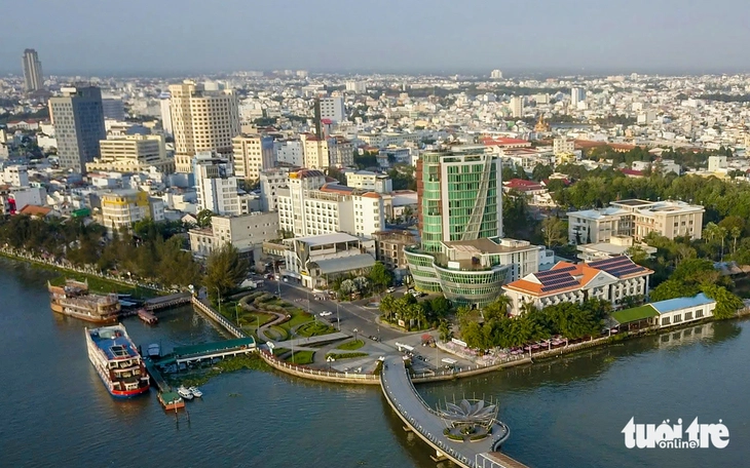
The center of Can Tho City in Vietnam's Mekong Delta region. Photo: Chi Quoc / Tuoi Tre
Can Tho, one of Vietnam's six centrally governed cities and home to nearly 1.5 million people, ranked 41st out of 63 provinces and cities nationwide in growth in 2024, and 6th out of 13 in the Mekong Delta region.
As a National Assembly delegate for Can Tho, the prime minister also accepted responsibility for the city's growth not matching its potential, strengths, and the level of central government investment.
His clear-eyed assessment should be seen not just as a warning, but as a directive for Can Tho to take action and address its shortcomings.
In recent years, the central government has paid significant attention to the city, pinning high hopes on a series of investment decisions for major projects, and granting special policy mechanisms, especially Resolution 45/2022, which offers six key policy groups tailored to Can Tho.
However, more than three years into implementation, the city has yet to produce a single concrete result from these mechanisms and policies.
Can Tho is now revealing multiple bottlenecks: sluggish growth, stagnant budget revenues, and a decline from its 2006 position as regional leader to now third place, overtaken by Long An and Kien Giang Provinces.
Major investment projects remain stalled. The Oncology Hospital has been under construction for eight years and is still unfinished.
A project worth over VND7 trillion (US$269.4 million) to upgrade a seven-kilometer stretch of National Highway 91 has gone through three leadership terms without breaking ground.
The VSIP Can Tho industrial park, once expected to lure hundreds of thousands of Mekong Delta workers back home with job prospects, is still dragging on, prompting the prime minister to lament: "With delays like this, how can businesses get down to work?"
These signs reflect the consequences of an ineffective and inefficient administrative apparatus.
Given the prime minister's frank evaluation, the question now is: What must Can Tho do? The answer cannot be rooted in emotion – it must come from measurable results, from development indicators.
The city must begin by clearing its bottlenecks and unlocking new development resources, with a focus on human capital, particularly the organizational and personnel systems, which are key.
A convincing response must span everything from the investment environment to governance indicators; from the capacity to attract investors to the city's influence in the region and across the country; from the quality of growth to public satisfaction.
Can Tho must reset its priorities in governance, placing people at the center and using effectiveness as the metric. Innovation in thinking and implementation must begin with a leadership team that dares to think, act, and take responsibility.
The proposed merger of Can Tho with Hau Giang and Soc Trang Provinces should not be viewed merely as an administrative reshuffle. It is a chance to restructure development space and reorganize operations, creating new momentum for the city through internal and interregional linkages with Ho Chi Minh City, southeast Vietnam, and the nation at large in the new context.
New mechanisms cannot be run with outdated methods.
The demands of today's development go beyond internal unity and top-down consensus.
Can Tho must break through in development thinking, mobilize resources via policy, make public investment more effective, encourage private investment, improve quality of life, and boost the competitiveness of its government system.
As a Can Tho native, like many who care about it, I worry deeply about the city's current state. But I continue to place my faith and hope in its future growth.
Yet faith must not be a fleeting emotion. It must be cultivated and sustained by tangible actions, rooted in knowledge, intellect, and courage – real achievements of the city's development.
More importantly, it requires the bravery of those in power to respond to the 'shameful' reality the prime minister has pointed out.
* The Vietnamese version of this article was written by Tran Huu Hiep, who has a doctorate in economics and is currently the vice-chairman of the Mekong Delta Tourism Association.


Max: 1500 characters
There are no comments yet. Be the first to comment.